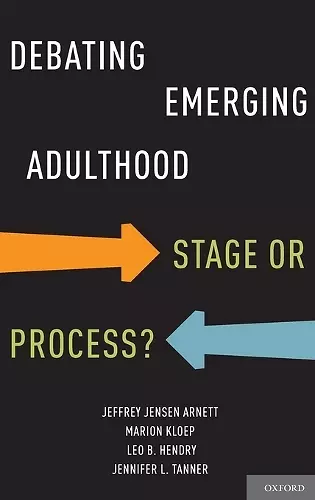Debating Emerging Adulthood
Stage or Process?
Marion Kloep author Jeffrey Jensen Arnett author Leo B Hendry author Jennifer L Tanner author
Format:Hardback
Publisher:Oxford University Press Inc
Published:3rd Feb '11
Currently unavailable, and unfortunately no date known when it will be back

The transition from adolescence to adulthood has undergone significant changes in recent decades. Unlike a half century ago, when young people in industrialized countries moved from adolescence into young adulthood in relatively short order at around age 20, now the decade from the late teens to the late twenties is seen as an extended time of self-focused exploration and education in pursuit of optimally fulfilling relationships and careers. Recognition of this new period is stronger than ever, but an important question remains: should emerging adulthood be considered a developmental stage, or a process? In Debating Emerging Adulthood: Stage or Process? two pairs of developmental psychologists take sides in a debate that is central to the very concept of emerging adulthood. Arnett and Tanner argue that as young people around the world share demographic similarities, such as longer education and later marriage, the years between the ages 18 and 25 are best understood as entailing a new life stage. However, because the experiences of emerging adults worldwide vary according to cultural context, educational attainment, and social class, these two scholars suggest that there may not be one but many different emerging adulthoods. An important issue for this burgeoning area of inquiry is to explore and describe this variation. In contrast, Hendry and Kloep assert that stage theories have never been able to explain individual transitions across the life course; in their view, stage theories-including the theory of emerging adulthood-ought to be abolished altogether, and explanations found for the processes and mechanisms that govern human change at any age. This engaging book maps out the argument of "stage or process" in detail, with vigorous disagreements, conflicting alternatives, and some leavening humor, ultimately even finding some common ground. Debating Emerging Adulthood is an absolute must-read for developmental psychologists as well as anyone interested in this indisputably important time of life.
"This book is a real treat as advocates of emerging adulthood as a stage, present their evidence and then invite opponents to offer an economic-cultural argument with their data. A point-counter-point exchange follows as the adversaries collaborate in lively debate. Who wins? First, the reader whose intelligence is challenged with rich material worthy of emerging adulthood's complexity. And second, our discipline which comes of age when false attacks on 'straw men' are set aside so that a complex reality can be forthrightly considered from multiple perspectives."--James Youniss, Ph.D., Research Professor, Department of Psychology, Catholic University of America, and co-editor of Engaging Young People in Civic Life (Vanderbilt University Press 2009) "This multi-authored volume provides a much-needed, multi-perspective analysis of the model of emerging adulthood proposed by Jeffrey Arnett. While Arnett and Tanner present a useful description of the currently prolonged transition to adulthood, Hendry and Kloep show readers how to critically analyze Arnett's model, with an eye to discerning the limitations of that description as well as the error of the implicit prescriptions of the model regarding how young people ought to be negotiating this prolonged transition."--James Côté, Ph.D., Professor, Department of Sociology, University of Western Ontario, Canada "Developmental science has a long and rich history regarding the philosophical, conceptual, and theoretical issues that must be addressed in order to successfully postulate the presence of a stage of human ontogeny. Accordingly, to advance developmental theory appropriately and, as well, to adequately use theory to frame research, it is necessary to embed ideas about the nature of the developmental process within both the long-understood issues about positing stages of development and, today, within the cutting-edge of contemporary developmental theory, that is, within developmental systems theoretical models. This book clearly shows the necessity of continuing academic debate about the necessity for such philosophical, historical, and theoretical framing."--Richard M. Lerner, Ph.D, Bergstrom Chair in Applied Developmental Science and Director, Institute for Applied Research in Youth Development, Eliot-Pearson Department of Child Development, Tufts University
ISBN: 9780199757176
Dimensions: 157mm x 231mm x 23mm
Weight: 431g
192 pages